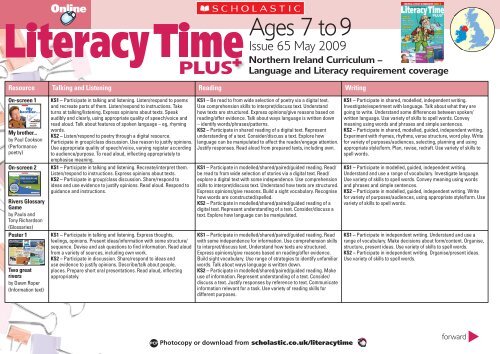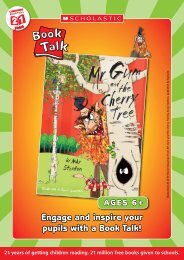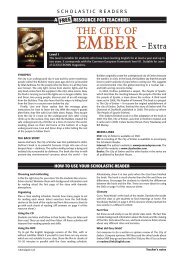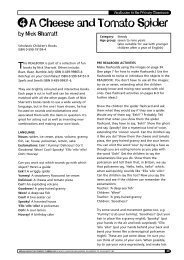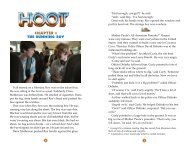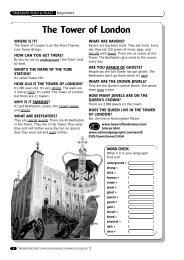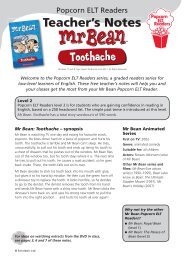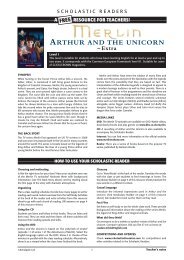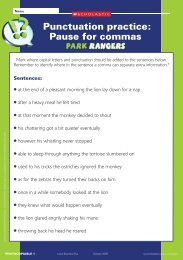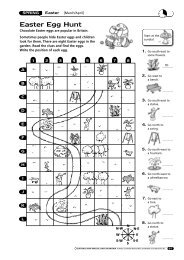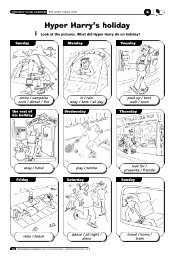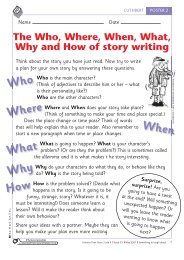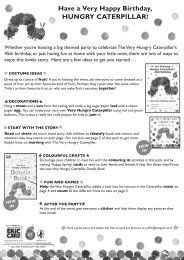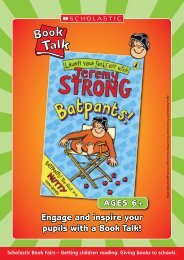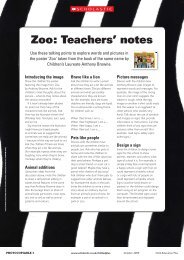Ages 7 to 9 - Scholastic
Ages 7 to 9 - Scholastic
Ages 7 to 9 - Scholastic
Create successful ePaper yourself
Turn your PDF publications into a flip-book with our unique Google optimized e-Paper software.
Online<br />
<strong>Ages</strong> 7 <strong>to</strong> 9<br />
Issue 65 May 2009<br />
Northern Ireland Curriculum –<br />
Language and Literacy requirement coverage<br />
Resource Talking and Listening Reading Writing<br />
On-screen 1<br />
My brother...<br />
by Paul Cookson<br />
(Performance<br />
poetry)<br />
On-screen 2<br />
Rivers Glossary<br />
Game<br />
by Paula and<br />
Tony Richardson<br />
(Glossaries)<br />
Poster 1<br />
Two great<br />
rivers<br />
by Dawn Roper<br />
(Information text)<br />
KS1 – Participate in talking and listening. Listen/respond <strong>to</strong> poems<br />
and recreate parts of them. Listen/respond <strong>to</strong> instructions. Take<br />
turns at talking/listening. Express opinions about texts. Speak<br />
audibly and clearly, using appropriate quality of speech/voice and<br />
read aloud. Talk about features of spoken language – eg, rhyming<br />
words.<br />
KS2 – Listen/respond <strong>to</strong> poetry through a digital resource.<br />
Participate in group/class discussion. Use reason <strong>to</strong> justify opinions.<br />
Use appropriate quality of speech/voice, varying register according<br />
<strong>to</strong> audience/purpose. To read aloud, inflecting appropriately <strong>to</strong><br />
emphasise meaning.<br />
KS1 – Participate in talking and listening. Recreate/interpret them.<br />
Listen/respond <strong>to</strong> instructions. Express opinions about texts.<br />
KS2 – Participate in group/class discussion. Share/respond <strong>to</strong><br />
ideas and use evidence <strong>to</strong> justify opinions. Read aloud. Respond <strong>to</strong><br />
guidance and instructions.<br />
KS1 – Participate in talking and listening. Express thoughts,<br />
feelings, opinions. Present ideas/information with some structure/<br />
sequence. Devise and ask questions <strong>to</strong> find information. Read aloud<br />
from a variety of sources, including own work.<br />
KS2 – Participate in discussion. Share/respond <strong>to</strong> ideas and<br />
use evidence <strong>to</strong> justify opinions. Describe/talk about people,<br />
places. Prepare short oral presentations. Read aloud, inflecting<br />
appropriately.<br />
KS1 – Be read <strong>to</strong> from wide selection of poetry via a digital text.<br />
Use comprehension skills <strong>to</strong> interpret/discuss text. Understand<br />
how texts are structured. Express opinions/give reasons based on<br />
reading/offer evidence. Talk about ways language is written down<br />
– identify words/phrases/patterns.<br />
KS2 – Participate in shared reading of a digital text. Represent<br />
understanding of a text. Consider/discuss a text. Explore how<br />
language can be manipulated <strong>to</strong> affect the reader/engage attention.<br />
Justify responses. Read aloud from prepared texts, including own.<br />
KS1 – Participate in modelled/shared/paired/guided reading. Read/<br />
be read <strong>to</strong> from wide selection of s<strong>to</strong>ries via a digital text. Read/<br />
explore a digital text with some independence. Use comprehension<br />
skills <strong>to</strong> interpret/discuss text. Understand how texts are structured.<br />
Express opinions/give reasons. Build a sight vocabulary. Recognise<br />
how words are constructed/spelled.<br />
KS2 – Participate in modelled/shared/paired/guided reading of a<br />
digital text. Represent understanding of a text. Consider/discuss a<br />
text. Explore how language can be manipulated.<br />
KS1 – Participate in modelled/shared/paired/guided reading. Read<br />
with some independence for information. Use comprehension skills<br />
<strong>to</strong> interpret/discuss text. Understand how texts are structured.<br />
Express opinions/give reasons based on reading/offer evidence.<br />
Build sight vocabulary. Use range of strategies <strong>to</strong> identify unfamiliar<br />
words. Talk about ways language is written down.<br />
KS2 – Participate in modelled/shared/paired/guided reading. Make<br />
use of information. Represent understanding of a text. Consider/<br />
discuss a text. Justify responses by reference <strong>to</strong> text. Communicate<br />
information relevant for a task. Use variety of reading skills for<br />
different purposes.<br />
KS1 – Participate in shared, modelled, independent writing.<br />
Investigate/experiment with language. Talk about what they are<br />
going <strong>to</strong> write. Understand some differences between spoken/<br />
written language. Use variety of skills <strong>to</strong> spell words. Convey<br />
meaning using words and phrases and simple sentences.<br />
KS2 – Participate in shared, modelled, guided, independent writing.<br />
Experiment with rhymes, rhythms, verse structure, word play. Write<br />
for variety of purposes/audiences, selecting, planning and using<br />
appropriate style/form. Plan, revise, redraft. Use variety of skills <strong>to</strong><br />
spell words.<br />
KS1 – Participate in modelled, guided, independent writing.<br />
Understand and use a range of vocabulary. Investigate language.<br />
Use variety of skills <strong>to</strong> spell words. Convey meaning using words<br />
and phrases and simple sentences.<br />
KS2 – Participate in modelled, guided, independent writing. Write<br />
for variety of purposes/audiences, using appropriate style/form. Use<br />
variety of skills <strong>to</strong> spell words.<br />
KS1 – Participate in independent writing. Understand and use a<br />
range of vocabulary. Make decisions about form/content. Organise,<br />
structure, present ideas. Use variety of skills <strong>to</strong> spell words.<br />
KS2 – Participate in independent writing. Organise/present ideas.<br />
Use variety of skills <strong>to</strong> spell words.<br />
PCP Pho<strong>to</strong>copy or download from scholastic.co.uk/literacytime<br />
forward
Online<br />
back<br />
<strong>Ages</strong> 7 <strong>to</strong> 9<br />
Issue 65 May 2009<br />
continued<br />
Northern Ireland Curriculum –<br />
Language and Literacy requirement coverage<br />
Resource Talking and Listening Reading Writing<br />
Poster 2<br />
Why is flooding<br />
on the increase?<br />
by David Clay<strong>to</strong>n<br />
(Explanation text)<br />
Leaflet 1<br />
Krishna and<br />
Kaliya<br />
by Shantha Rao<br />
(Traditional tale)<br />
Leaflet 2<br />
Rivers of<br />
rhymes<br />
by various poets<br />
(Poems in<br />
different forms on<br />
a theme)<br />
KS1 – Participate in talking and listening. Express thoughts,<br />
feelings, opinions. Present ideas/information with some structure/<br />
sequence. Devise and ask questions <strong>to</strong> find information. Read aloud<br />
from a variety of sources, including own work.<br />
KS2 – Participate in discussion. Share/respond <strong>to</strong> ideas and<br />
use evidence <strong>to</strong> justify opinions. Describe/talk about people,<br />
places. Prepare short oral presentations. Read aloud, inflecting<br />
appropriately.<br />
KS1 – Participate in talking and listening. Listen/respond <strong>to</strong> s<strong>to</strong>ries.<br />
Recreate/retell/interpret them. Tell own s<strong>to</strong>ries. Take part in drama<br />
activities. Express opinions about texts. Speak audibly and clearly,<br />
using appropriate quality of speech/voice and read aloud. Talk about<br />
features of spoken language. Read aloud from a variety of sources,<br />
including own work.<br />
KS2 – Listen/respond <strong>to</strong> fiction. Tell/retell/interpret s<strong>to</strong>ries. Group/<br />
class discussion. Share/respond <strong>to</strong> ideas and use evidence <strong>to</strong> justify<br />
opinions. Participate in drama activities. Use appropriate quality<br />
of speech/voice, varying register according <strong>to</strong> audience/purpose.<br />
Read aloud, inflecting appropriately, <strong>to</strong> emphasise meaning of texts.<br />
KS1 – Participate in talking and listening. Listen/respond <strong>to</strong>/explore<br />
poems and recreate parts of them. Express thoughts, feelings,<br />
opinions about texts. Speak audibly and clearly, using appropriate<br />
quality of speech/voice and read aloud. Talk about features of<br />
spoken language – eg, rhyming words.<br />
KS2 – Listen/respond <strong>to</strong> poetry. Participate in group/class<br />
discussion. Use reason <strong>to</strong> justify opinions. Use appropriate quality<br />
of speech/voice, varying register according <strong>to</strong> audience/purpose.<br />
Read aloud, inflecting appropriately <strong>to</strong> emphasise meaning and<br />
express thoughts and feelings.<br />
KS1 – Participate in modelled/shared/paired/guided reading. Read<br />
with some independence for information. Use comprehension skills<br />
<strong>to</strong> interpret/discuss text. Understand how texts are structured.<br />
Express opinions/give reasons based on reading/offer evidence.<br />
Build sight vocabulary. Use range of strategies <strong>to</strong> identify unfamiliar<br />
words. Talk about ways language is written down.<br />
KS2 – Participate in modelled/shared/paired/guided reading. Make<br />
use of information. Represent understanding of a text. Consider/<br />
discuss a text. Justify responses by reference <strong>to</strong> text. Communicate<br />
information relevant for a task. Use variety of reading skills for<br />
different purposes.<br />
KS1 – Participate in modelled/shared/paired/guided reading.<br />
Read/be read <strong>to</strong> from wide selection of s<strong>to</strong>ries. Act out a text.<br />
Read/explore a text with some independence. Use comprehension<br />
skills <strong>to</strong> interpret/discuss text. Understand how texts are structured.<br />
Express opinions/give reasons based on reading/offer evidence.<br />
How language is written down – identify words/phrases/patterns.<br />
KS2 – Participate in modelled/shared/paired/guided reading of a<br />
text. Represent understanding of a text. Consider/discuss a text.<br />
Explore how language can be manipulated <strong>to</strong> affect the reader/<br />
engage attention. Justify responses. Read aloud from prepared<br />
texts, including own.<br />
KS1 – Participate in modelled/paired/guided reading. Be read<br />
<strong>to</strong> from wide selection of poetry. Use comprehension skills <strong>to</strong><br />
interpret/discuss text. Understand how texts are structured. Express<br />
opinions/give reasons based on reading/offer evidence. Read/share<br />
own books of poems. Build sight vocabulary. Use strategies <strong>to</strong><br />
identify unfamiliar words. Talk about ways language is written down<br />
– identify words/phrases/patterns.<br />
KS2 – Participate in guided reading. Represent understanding of<br />
a text. Consider/discuss a text. Develop preferences. Explore how<br />
language can be manipulated <strong>to</strong> affect the reader/engage attention.<br />
Justify responses. Read aloud from prepared texts, including own.<br />
KS1 – Participate in independent writing. Understand and use a<br />
range of vocabulary. Make decisions about form/content. Organise,<br />
structure, present ideas. Use variety of skills <strong>to</strong> spell words.<br />
KS2 – Participate in independent writing. Organise/present ideas.<br />
Use variety of skills <strong>to</strong> spell words.<br />
KS1 – Participate in shared, modelled, guided, independent writing.<br />
Investigate/experiment with language. Talk about what they are<br />
going <strong>to</strong> write. Understand some differences between spoken/<br />
written language. Use variety of skills <strong>to</strong> spell words. Convey<br />
meaning using words and phrases and simple sentences.<br />
KS2 – Participate in shared, modelled, guided, paired, independent<br />
writing. Write for variety of purposes/audiences, selecting, planning<br />
and using appropriate style/form. Use stylistic features <strong>to</strong> create<br />
mood/effect. Plan, revise, redraft. Use variety of skills <strong>to</strong> spell words.<br />
KS1 – Participate in modelled, independent writing. Investigate/<br />
experiment with language. Talk about what they are going <strong>to</strong> write.<br />
Express thoughts and feelings. Use variety of skills <strong>to</strong> spell words.<br />
Convey meaning using words and phrases and simple sentences.<br />
KS2 – Participate in modelled, guided, independent writing.<br />
Experiment with rhymes, rhythms, verse structure, word play. Write<br />
for variety of purposes/audiences, selecting, planning and using<br />
appropriate style/form. Plan, revise, redraft. Use variety of skills <strong>to</strong><br />
spell words.<br />
PCP Pho<strong>to</strong>copy or download from scholastic.co.uk/literacytime


